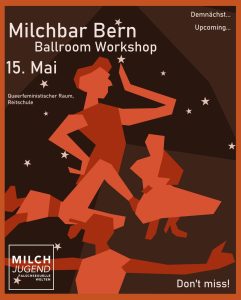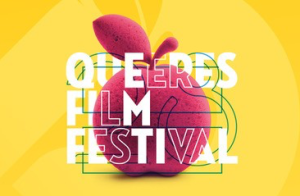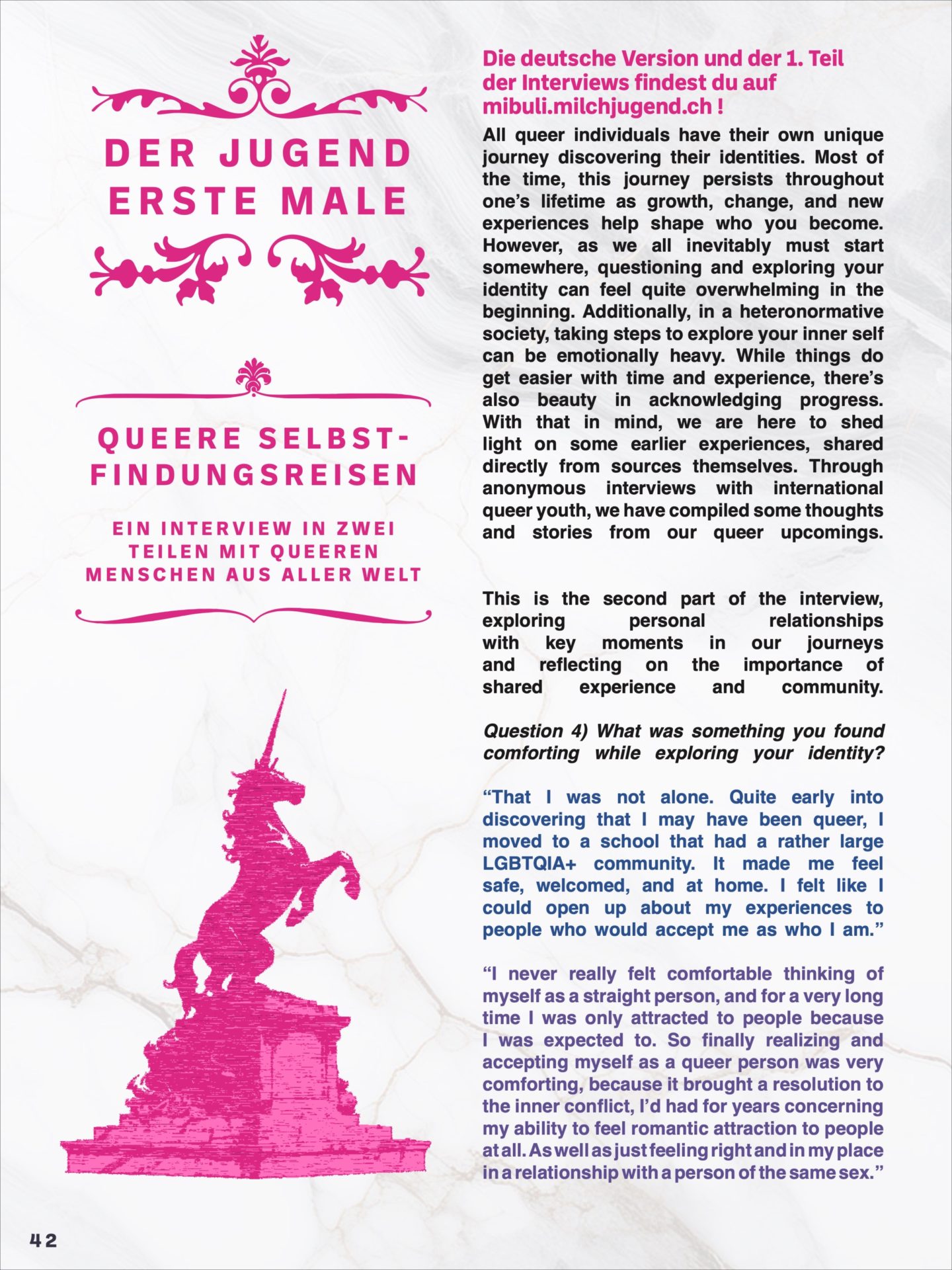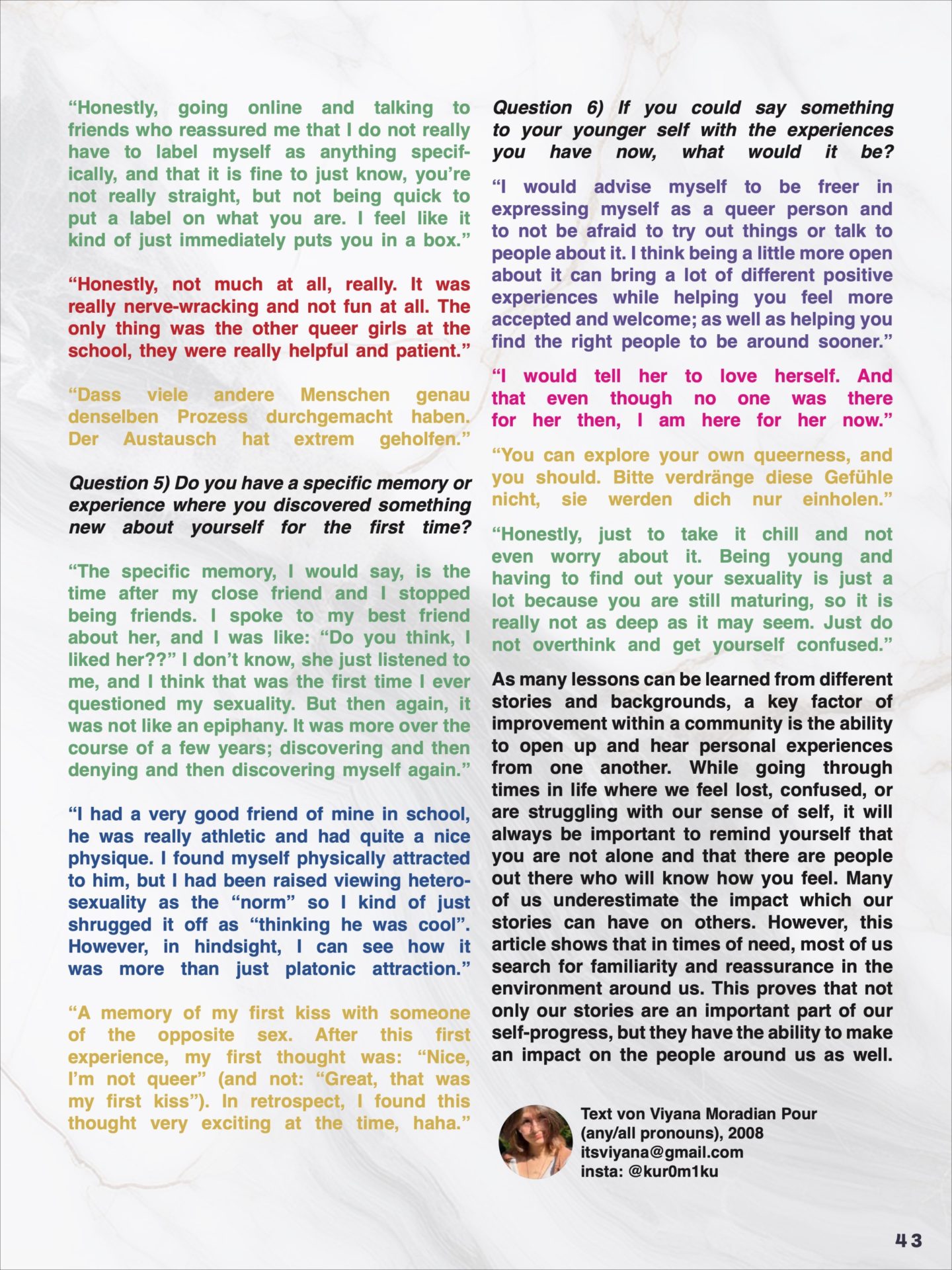Hier findest du Teil 2 auf Deutsch
All queer individuals have their own unique journey discovering their identities. Most of the time, this journey persists throughout one’s lifetime as growth, change, and new experiences help shape who you become. However, as we all inevitably must start somewhere, questioning and exploring your identity can feel quite overwhelming in the beginning. Additionally, in a heteronormative society, taking steps to explore your inner self can be emotionally heavy. While things do get easier with time and experience, there’s also beauty in acknowledging progress. With that in mind, we are here to shed light on some earlier experiences, shared directly from sources themselves. Through anonymous interviews with international queer youth, we have compiled some thoughts and stories from our queer upcomings.
This is the second part of the interview, exploring personal relationships with key moments in our journeys and refl ecting on the importance of shared experience and community.
Question 4: What was something you found comforting while exploring your identity?
“That I was not alone. Quite early into discovering that I may have been queer, I moved to a school that had a rather large LGBTQIA+ community. It made me feel safe, welcomed, and at home. I felt like I could open up about my experiences to people who would accept me as who I am.””
“I never really felt comfortable thinking of myself as a straight person, and for a very long time I was only attracted to people because I was expected to. So fi nally realizing and accepting myself as a queer person was very comforting, because it brought a resolution to the inner confl ict, I’d had for years concerning my ability to feel romantic attraction to people at all. As well as just feeling right and in my place in a relationship with a person of the same sex.””
“Honestly, going online and talking to friends who reassured me that I do not really have to label myself as anything specifically, and that it is fi ne to just know, you’re not really straight, but not being quick to put a label on what you are. I feel like it kind of just immediately puts you in a box.”
“Honestly, not much at all, really. It was really nerve-wracking and not fun at all. The only thing was the other queer girls at the school, they were really helpful and patient.”
«Dass viele andere Menschen genau denselben Prozess durchgemacht haben. Der Austausch hat extrem geholfen.»
Question 5: Do you have a specifi c memory or experience where you discovered something new about yourself for the fi rst time?
“The specific memory, I would say, is the time after my close friend and I stopped being friends. I spoke to my best friend about her, and I was like: “Do you think, I liked her??” I don’t know, she just listened to me, and I think that was the fi rst time I ever questioned my sexuality. But then again, it was not like an epiphany. It was more over the course of a few years; discovering and then denying and then discovering myself again.”
“I had a very good friend of mine in school, he was really athletic and had quite a nice physique. I found myself physically attracted to him, but I had been raised viewing heterosexuality as the “norm” so I kind of just shrugged it off as “thinking he was cool”. However, in hindsight, I can see how it was more than just platonic attraction.”
“A memory of my fi rst kiss with someone of the opposite sex. After this fi rst experience, my fi rst thought was: “Nice, I’m not queer” (and not: “Great, that was my fi rst kiss”). In retrospect, I found this thought very exciting at the time, haha.”
Question 6: If you could say something to your younger self with the experiences you have now, what would it be?
“I would advise myself to be freer in expressing myself as a queer person and to not be afraid to try out things or talk to people about it. I think being a little more open about it can bring a lot of different positive experiences while helping you feel more accepted and welcome; as well as helping you find the right people to be around sooner.”
“I would tell her to love herself. And that even though no one was there for her then, I am here for her now.”
“You can explore your own queerness, and you should. Bitte verdränge diese Gefühle nicht, sie werden dich nur einholen.”
“Honestly, just to take it chill and not even worry about it. Being young and having to fi nd out your sexuality is just a lot because you are still maturing, so it is really not as deep as it may seem. Just do not overthink and get yourself confused.”
As many lessons can be learned from different stories and backgrounds, a key factor of improvement within a community is the ability to open up and hear personal experiences from one another. While going through times in life where we feel lost, confused, or are struggling with our sense of self, it will always be important to remind yourself that you are not alone and that there are people out there who will know how you feel. Many of us underestimate the impact which our stories can have on others. However, this article shows that in times of need, most of us search for familiarity and reassurance in the environment around us. This proves that not only our stories are an important part of our self-progress, but they have the ability to make an impact on the people around us as well.






